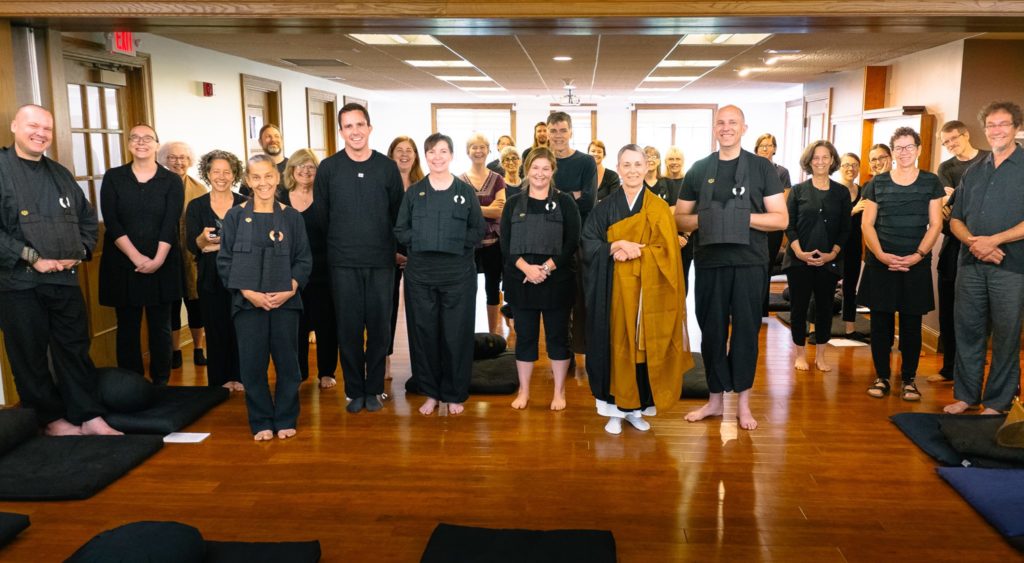A practitioner at a meditation retreat asks a question.
Q: What am I practicing here that helps me be more present and connected in my daily life?
A: Here, what you’re practicing is presence and connection, so that you can be more present and connected. Although right now you’re in a different place doing something different than usual, this really is your daily life. Yours alone. Even among all of us gathered here in one place, no one else is having the experience that you are having. Furthermore, if I were to tell you that practice is transactional, that if you sit like this you’re going to have a certain wonderful experience in your other, “normal” life someday – that would be a lie. This isn’t a transaction. Practice isn’t a product, a course of study or a life hack. There are not two things: your life and your practice. They are the same thing. You never leave your life, and the point is to never leave your practice. It’s all one thing.
We are here practicing being human beings. This is the practice of being a human being. In the old days they called Zen the practice of everyday life. You think, “This isn’t my everyday life. This is the opposite of my everyday life.” But nonetheless, this is your everyday life. Since the very beginning, and I don’t know why, human beings are not so good at everyday life. Unless they really practice everyday life.
Can I practice handling just this moment, however it is? Because when I’m out and about in my everyday life, I’m perfectly fine until someone does something that I don’t like or something happens that I don’t want. That’s where it gets tough, and it can get tough every day. It can get tough today. This environment here is very artificial and contrived. We’ve arranged ourselves in this nearly empty room, everyone in funny clothes trying to sit still and be silent. We don’t intentionally add stress here, but you experience stress here. I promise you that in your life, you experience stress. Can you sit it out? Wait it out? Breathe it out? Refrain from involving yourself in sticky situations that you don’t need to be in?
I can only speak from my own experience. At a certain point in my everyday life, I just could not handle it! I didn’t want any more of it! I tried everything I could think of to fix the problems and nothing worked. So when I finally sat down like this, it was an act of complete surrender. A sign of total failure. I’m going to have to do this on my own, I said. I’m going to have to figure out how to be a human being, with a life that has other people and things in it.
That’s what we’re here to do. And why do we do it? I think it’s why we do everything. Not because we’re high-minded or religious. This is not a religion. It’s a practice. You do not worship Buddha, and you do not worship me. Let’s see for a moment if you can stop worshipping yourself.
We’re here for love, because we have a capacity for love and we want to love and we want to be loved. That’s the connection. It’s not romantic love. It’s unconditional love. Unconditional love is pure presence.
Here we are among strangers. It’s a good idea to find love among strangers. It gets complicated after you know each other’s names and stories. When you know all that, you might find that you can’t relate to someone else. You might not even be able to tolerate them. But here you can simply have respect and gratitude for one another. Here you can just be present with everyone and everything.
It’s a beautiful practice, this practice of presence. It comes in many shapes and forms. Some people find connection on a swim team, or a cooking class, or off-road racing. And then you wonder how does that apply to life? But it does.
What we’re doing here this weekend requires a very modest amount of time, compared to how long it takes to stream a Netflix series. And it is relatively painless. So ask yourself. Why am I here?
Beginner’s Mind One-Day Retreat
Hazy Moon Zen Center
Los Angeles
March 31, 2019
Spring Wind Weekend Retreat
Holy Wisdom Monastery
Madison, WI
April 11-14, 2019
Photo: The Dewdrop Sangha by Rick McCleary.
This is an excerpt from an informal Q&A at one of this year’s Dewdrop Sangha meditation retreats. You can listen to the full recording here.




See you in March ♡
Comment by Bonnie Rae — December 13, 2018 @ 12:03 pm
Thank you for sharing this, it allows those of us who can’t be there to still be there. ❤️
Comment by Sarah — December 14, 2018 @ 4:48 am
Yes beautiful. Like Khalil Gibran says in The Prophet, that love will completely break down the stone you call your heart until it becomes the fertile ground where love can blossom.
The stress and the sadness is the resistance to that proces. The beauty is, when you look at children, they cannot NOT love. So where they land is what they will love. They have no criteria for loving like adults often do have.
Comment by Sim — December 20, 2018 @ 3:36 am